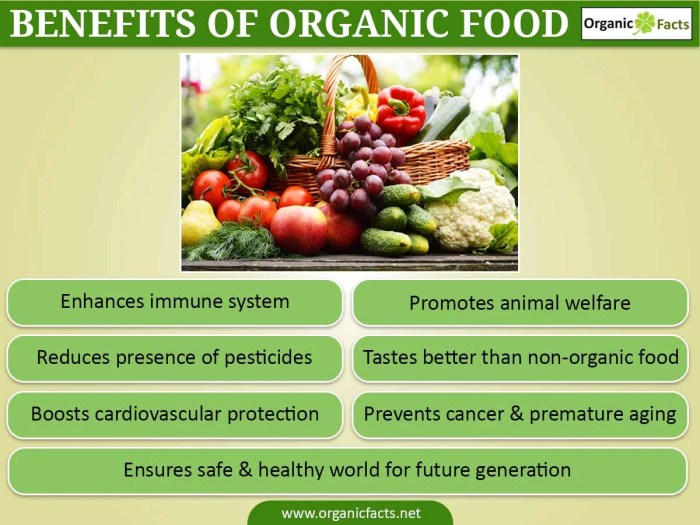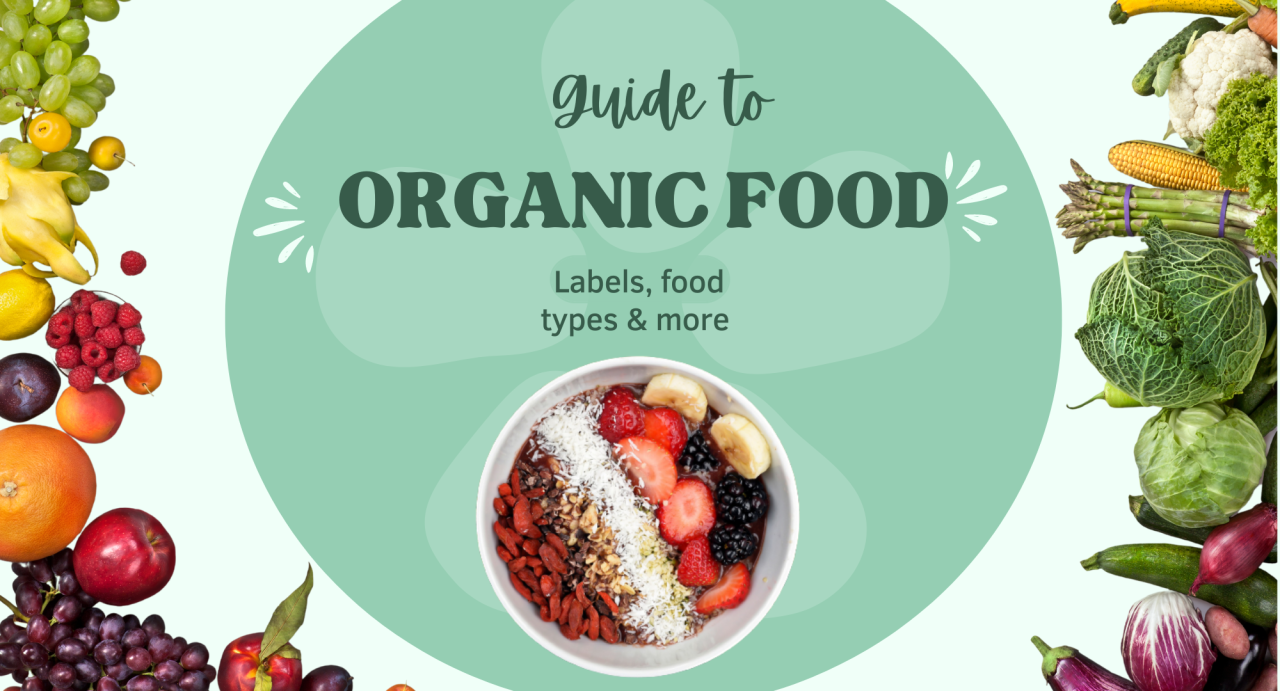Organic food benefits are all the rage right now, and for good reason. From better health to a cleaner environment, the perks of choosing organic are endless. Get ready to dive into the world of organic goodness!
Introduction to Organic Food Benefits
Organic food refers to produce and other agricultural products that are grown without the use of synthetic pesticides, fertilizers, genetically modified organisms (GMOs), or other harmful chemicals. The significance of organic food lies in its commitment to sustainability, health, and environmental protection.
Organic food is gaining popularity due to increasing consumer awareness about the potential health risks associated with consuming conventional foods that contain harmful chemicals. People are becoming more conscious of the impact of their food choices on their health and the environment, leading them to seek out organic alternatives.
Statistics show that the organic food industry has been experiencing significant growth in recent years. According to the Organic Trade Association, organic food sales in the United States reached $47.9 billion in 2018, marking a 5.9% increase from the previous year. This growth trend is expected to continue as more consumers prioritize health and sustainability in their food choices.
Health Benefits of Organic Food

Eating organic food has numerous health benefits that can positively impact your overall well-being. One major advantage is that organic food is free from synthetic chemicals commonly found in conventional produce. This means that you are not exposing yourself to harmful pesticides, herbicides, and other artificial additives that can have negative effects on your health.
Nutritional Value Comparison
When comparing the nutritional value of organic versus conventional produce, studies have shown that organic food tends to have higher levels of certain nutrients. For example, organic fruits and vegetables have been found to contain more antioxidants, which can help protect your cells from damage and reduce the risk of chronic diseases.
Specific Health Benefits
- Organic food is often fresher, as it does not contain preservatives that extend shelf life. This means you are getting food that is richer in nutrients and vitamins.
- Consuming organic meat and dairy products can reduce your exposure to antibiotics and synthetic hormones commonly used in conventional animal farming, which can have negative effects on your health.
- Organic farming practices promote soil health and biodiversity, which can have a positive impact on the environment and subsequently on your health.
Environmental Benefits of Organic Farming
Organic farming practices not only benefit our health but also have a positive impact on the environment. By choosing organic products, we contribute to reducing pollution and soil erosion, preserving biodiversity, and promoting sustainability.
Reduction of Pollution and Soil Erosion, Organic food benefits
- Organic farming avoids the use of synthetic pesticides and fertilizers, which can contaminate water sources and harm wildlife.
- By implementing crop rotation and natural methods of pest control, organic farms help maintain soil health and prevent erosion.
Importance of Biodiversity in Organic Agriculture
- Organic farming practices support a diverse ecosystem by avoiding monoculture and promoting the growth of various plant species.
- Biodiversity in organic agriculture helps maintain the balance of natural predators and pests, reducing the need for chemical interventions.
Promotion of Sustainability
- Organic farming focuses on long-term sustainability by preserving soil quality, conserving water resources, and reducing energy consumption.
- By adopting practices such as composting, cover cropping, and crop rotation, organic farmers contribute to the overall health of the environment.
Economic Benefits of Organic Food Production
Switching to organic practices can bring numerous economic benefits for farmers. By eliminating the use of synthetic pesticides and fertilizers, farmers can reduce input costs significantly. Organic farming also promotes soil health and biodiversity, leading to higher yields in the long run.
Market Demand for Organic Products
The market demand for organic products has been steadily increasing in recent years. Consumers are becoming more health-conscious and environmentally aware, driving the demand for organic food. This increased demand creates opportunities for farmers to fetch premium prices for their organic produce, resulting in higher profits.
Cost Savings in the Long Run
While transitioning to organic farming may require initial investments and adjustments, the long-term cost savings are substantial. Organic farming practices promote sustainable agriculture, reducing the dependence on expensive chemical inputs. Additionally, organic farmers can save on costs related to environmental remediation, as organic farming methods have a lower impact on the environment.
Safety and Pesticide Concerns with Conventional Foods

Pesticide residues in conventional foods pose serious risks to human health and the environment. These chemicals are used to protect crops from pests, but they can also have harmful effects when consumed.
Safety Standards in Organic vs. Conventional Food Production
Organic food production follows strict regulations that prohibit the use of synthetic pesticides, antibiotics, and hormones. This reduces the risk of pesticide residues in organic foods, making them a safer choice for consumers compared to conventional foods.
- Organic farmers use natural methods like crop rotation, beneficial insects, and composting to manage pests without harmful chemicals.
- In conventional farming, pesticides are sprayed directly on crops, leading to residues that can remain on food even after washing.
Harmful Effects of Pesticides on Human Health and the Environment
Pesticides have been linked to various health issues, including:
-
Increased risk of cancer
-
Disruption of the endocrine system
-
Developmental delays in children
Additionally, pesticides can contaminate soil and water sources, harming ecosystems and wildlife. Choosing organic foods can help reduce exposure to these harmful chemicals and support sustainable agricultural practices.